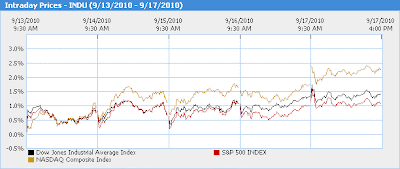The markets continued their upward trend this week. At the Friday close, the Dow rose 1.4%, the S&P 500 gained 1.5%, and the Nasdaq topped them both at 3.3%. Oil fell 3.7%, while gold hit a record high and silver reached 30-year highs.
Source: MSN Moneycentral
This was the third straight week of gains for the markets. Solid earnings from tech stocks provided momentum and economic data was mixed, but not disappointing. All-in-all, it was a pretty decent week, but the volume of trades remains stubbornly low. These market gains still show little conviction, but the wind is clearly at its back.
A record high price in gold was the story of the week on Wall Street. The rise is clearly due to concerns over government policies, both here and abroad. Investors see a weak economy with massive debts. This causes a worry over further quantitative easing from the Fed in an attempt to stimulate the market, with their rhetoric indicating that this is likely. European countries are also facing a similar fate, which added fuel to the gold fire this week.
The constant government intervention in the economy will weaken the dollar while being a boon to a true store of wealth, gold. Other precious metals like silver are affected to the upside, too. Unless we see something from governments worldwide to change our view, we really like this sector for the long term.
Also this week, we received inflation information in the forms of the Consumer and Producer Price Indices (CPI and PPI), which came in flat. What we find interesting, though, is a dichotomy between inflation and deflation. We are seeing things that people buy, like food and energy, costing more. On the other hand, things people own, like homes, are worth less. This trade off will likely result in little movement in net inflation or deflation. However, it is a terrible situation to be in, since products cost more, but people are worth less.
Next Week
It looks to be another busy week next week, although not as busy as last week. We will receive several reports on housing, but also the leading economic indicators and durable goods info. There will be several large corporate earnings releases we will be watching, like General Mills, AutoZone, Nike, and several housing companies.
Next week will also be the Fed meeting and their interest rate announcement. It is believed that rates will be held at the current record low, but we will be watching their language to determine any future policy changes.
Where are we investing now?
Currently, we see little change in our strategy amid this currently rising market. As we mentioned last week, there has been little to get us excited, but new bottoms often occur when things are darkest. Gold and precious metals have been an exciting story this year and we are pleased with the results. We would not buy any more at these high levels, but we would buy on the dips.
We still see poor economic conditions hampering the economy, though, so we remain cautious. The potential higher taxes, increasing government involvement in the private sector, and a still-high unemployment rate have us worried for the longer term.
In equities, we are focused on higher-quality and multi-national stocks, but some smaller stocks look promising, as well. We continue to avoid banking and insurance sector stocks. TIPs are important as we expect inflation to increase in the future, while
Commodities remain a longer term favorite, as inflation will also impact prices to the upside. Government policies will weaken the dollar over time, but it is currently benefiting from a flight to safety. Municipal bonds will play a more important role in our portfolios over the coming months and years as higher tax rates take effect. Finally, we are optimistic about international stocks, as emerging markets (excluding

